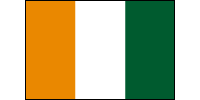| Country (long form) |
Republic of Cote d'Ivoire |
| Capital |
Yamoussoukro
note: although Yamoussoukro has been the capital since 1983, Abidjan remains the administrative center; the US, like other countries, maintains its Embassy in Abidjan |
| Total Area |
124,502.50 sq mi
322,460.00 sq km
(slightly larger than New Mexico) |
| Population |
16,393,221 (July 2001 est.)
note: estimates for this country explicitly take into account the effects of excess mortality due to AIDS; this can result in lower life expectancy, higher infant mortality and death rates, lower population and growth rates, and changes in the distribution of population by age and sex than would otherwise be expected |
| Estimated Population in 2050 |
35,707,824 |
| Languages |
French (official), 60 native dialects with Dioula the most widely spoken |
| Literacy |
48.5% total, 57.0% male, 40.0% female |
| Religions |
Christian 34%, Muslim 27%, no religion 21%, animist 15%, other 3% (1998)
note: the majority of foreigners (migratory workers) are Muslim (70%) and Christian (20%) |
| Life Expectancy |
43.58 male, 46.33 female (2001est.) |
| Government Type |
republic |
| Currency |
1 Communaute Financiere Africaine franc (CFAF) = 100 centimes |
| GDP (per capita) |
$1,600 (2000 est.) |
| Industry |
foodstuffs, beverages; wood products, oil refining, truck and bus assembly, textiles, fertilizer, building materials, electricity |
| Agriculture |
coffee, cocoa beans, bananas, palm kernels, corn, rice, manioc (tapioca), sweet potatoes, sugar, cotton, rubber; timber |
| Arable Land |
8% |
| Natural Resources |
petroleum, natural gas, diamonds, manganese, iron ore, cobalt, bauxite, copper, hydropower |
|


|